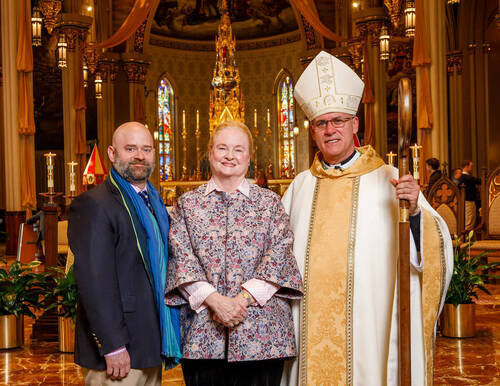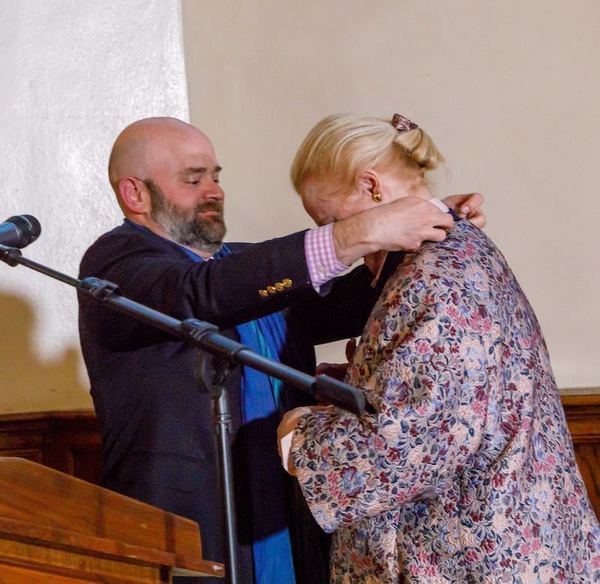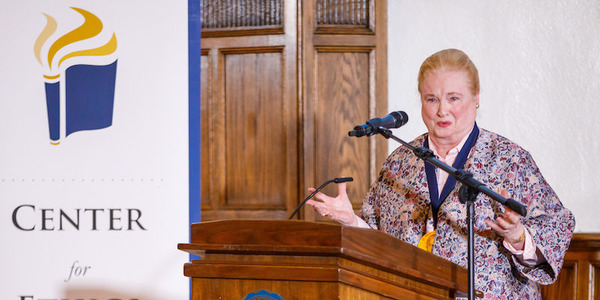
The University of Notre Dame's Center for Ethics and Culture presented the Notre Dame Evangelium Vitae Medal to Harvard Law School professor and former U.S. ambassador to the Holy See Mary Ann Glendon at a Mass and banquet on Saturday (April 28).
The Notre Dame Evangelium Vitae Medal, named for St. John Paul II’s 1995 encyclical on life issues, is the nation’s most important lifetime achievement award for heroes of the pro-life movement, honoring individuals whose efforts have served to proclaim the Gospel of human life by steadfastly affirming and defending its sanctity from its earliest stages.
In his homily at the Evangelium Vitae Mass in the Basilica of the Sacred Heart, Bishop Kevin C. Rhoades praised Glendon’s lifetime of witness as a fruit of her Christian faith. “Professor Mary Ann Glendon’s intelligent and courageous witness to the Gospel in her profession and in her generous service of the Church is undoubtedly a fruit of her communion with Jesus,” he said. “May the Lord bless Professor Mary Ann Glendon and all of us as we celebrate the Gospel of Life this evening.”
The medal presentation took place at a banquet that filled the university’s South Dining Hall with more than 450 friends, family, faculty and students. In his remarks at the banquet, center director O. Carter Snead praised Glendon as a personal hero and mentor, and reflected that the annual Evangelium Vitae Medal celebration represents the heart of Notre Dame’s mission in and to the world. “Look around you tonight, at this room filled with students, faculty and friends, gathered to celebrate life and human dignity,” he said. “This is Notre Dame.”
In her remarks, Glendon reflected that the medal was a recognition of the rank-and-file women and men who are the backbone of the pro-life cause. “Notre Dame, by honoring me tonight, is paying tribute to the great movement to which it has been my privilege to belong. It was not without reason that my dear friend Richard John Neuhaus called the pro-life movement the most broad-based, the most diverse and the most sustained expression of grassroots civic participation America has ever seen.”
She recalled this grassroots nature of the movement among her own circle of friends, as in 1990 they formed a Boston-area organization called “Women Affirming Life” that proudly proclaimed itself as “pro-life, pro-woman, pro-child and pro-poor.”
“Our membership grew and our members, according to their gifts and inclinations, threw themselves into assisting women in crisis pregnancies, organizing educational events, lobbying at the State House and providing that important kind of education that takes place in the home,” she said. “When Evangelium Vitae appeared [in 1995], we felt as though John Paul II himself had blessed every aspect of the work our members were doing.
“The prolife movement was built from the ground up by men and women from all races, nationalities, religions and walks of life, offering what they could with what they had,” she continued. “And that is the secret of the progress it has made in the places where it counts most: in the hearts and minds of American men and women.”
Glendon’s remarks inspired a standing ovation as she concluded, “Today, Our Lady’s University has smiled on the rank and file of the great human rights cause of our time. For that I can only say: Thank you, Notre Dame.”
Originally published by at ethicscenter.nd.edu on April 30.

